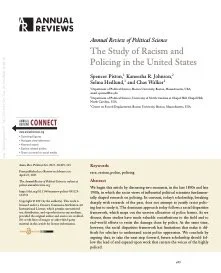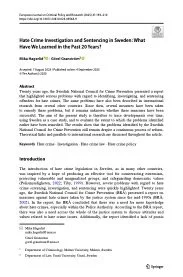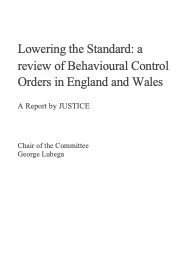By JUSTICE, Chair of the Committee George Lubega
The term ‘Behavioural Control Orders’ refers to a group of legal Orders that are imposed upon an individual via a civil court process or by an executive authority. They aim to address particular behaviours deemed to be objectionable. Sometimes the behaviours targeted constitute crimes in their own right; at other times the Orders are designed to tackle behaviour that falls below the criminal threshold. They do so by imposing restrictive conditions or requirements upon the person subject to them. These include conditions prohibiting association, being present within a particular geographical area, accessing the internet and can include electronic monitoring. Although Orders are imposed via a civil process and usually upon civil standards of evidence, breaching a condition within an Order is a criminal offence. There are an increasing number of Behavioural Control Orders (“Orders”) on the statute books of England and Wales, and their scope and availability appear to be ever-widening. Originally created to fill a gap present within the criminal law, e.g., the difficulty of prosecuting individual instances of football hooliganism, they have rapidly expanded to new areas and now cover behaviour which is, in and of itself, a criminal offence – punishable via the criminal law. For example, Orders now exist to address anti-social behaviour, protests, drug use, knife possession, gang-crime, stalking, and sexual offending, among other matters. Some Orders can differ in terms of who they protect (a specific individual, the public at large, or even a particular place); who may seek or impose an Order; whether an Order can be made on complaint, on conviction, or both; whether they can be imposed on children, or on adults only; the types of conditions and requirements that they can impose; what outcome the Order is intended to achieve and, accordingly, the legal test to be applied (including the standard of proof). The reasons for the variations is unclear and, in any event, has caused confusion across the country. This, in turn, has resulted in inconsistency in the ways in which Orders are used, and the protections afforded to victims. Surprisingly, despite their proliferation and the serious subject matter which they address, Behavioural Control Orders have never been the subject of any systematic, government-led review. It is not clear how the effectiveness of Orders should be measured, nor what ‘success’ should look like. Very little attention has been paid to whether the Behavioural Control Order ‘model’, works. The Working Party has sought to shed light on this question by examining the extent to which Orders are effective for victims, fair, accessible, proportionate, and rights compliant. Overarching Concerns Notwithstanding the variations between Orders, the Working Party identified a number of common, overarching concerns. Orders are often conceived of as a solution to complex social problems. They seek to prevent harms, protect vulnerable individuals, and offer rehabilitation to those accused of committing unwanted conduct. Whilst the policy papers accompanying their introduction stress that they are not intended to be punitive, their duration, the breadth of conditions they impose and the punishment for breach means that in practice, they are often perceived and experienced as such. Moreover, rather than diverting individuals out of the criminal justice system, the Working Party heard criticisms that Orders draw people, especially children, further intro the criminal justice system (owing to the possibility of criminal sanctions for breach). The bar for what conduct may be prohibited by an Order is very low in practice. For example, some Orders have been imposed on individuals as a result of them “closing the door too loudly" and impose conditions which prohibit “sitting on a pavement” or “wearing a bikini in the garden”. Arguably, such prohibitions are reflective of a loss of perspective on what degree of behaviour should properly be controlled by the State, and thereafter criminalised. At the same time, it risks diverting attention away from those really responsible for causing harm. On the other hand, some forms of Order can be said to criminalise individuals ‘by the back door’, by overlapping with existing criminal offences. Procedures for obtaining Orders generally do not require the rigour that proving a criminal charge does, with the tests to be applied often much broader than the wording of a statutory offence. Although proceedings for breach (as a separate offence) are brought before a criminal court, the conduct amounting to a breach may in fact be much less serious than the nature of the Order implies. Despite this, most contributors agreed that in certain circumstances, and when used appropriately, Orders could be useful tools in protecting victims from harm. This is especially true where used to protect a particular person, in the context of harms generally constituted by escalating or cumulative conduct. For example, Orders such as Stalking Protection Orders are effective, provided enforcement bodies apply for them. And Non-Molestation Orders can provide relief to victims of domestic abuse, as long as breaches are followed up and provided that victims are applying for them – not because the police have failed to help them - but because it is their preference to take action themselves. Nonetheless, more planning and consultation is required at the legislative phase, to ensure Orders are capable of achieving their aims, and enforcement bodies are set up to use them effectively. Little is currently done to assess how Orders will work in practice, and the views of interested parties, including experts and victims, and organisations working with offenders, are not meaningfully considered, nor their concerns adequately addressed. A consequence of this is that Orders can be performative in nature. The Working Party heard criticisms that Orders often reflect a “knee-jerk reaction” to high-profile issues, treating the symptom rather than the cause. It is doubtful whether a legal Order alone, can ever have a significant impact on reducing harm without the State taking responsibility for tackling the causes: inequality, poverty, inadequate housing, education and an under-resourced mental health service. Even where Orders have been found to be effective in providing relief to victims – as with Stalking Protection Orders, Non-Molestation Orders and Sexual Harm Prevention Orders - the failure to make resources available for training, enforcement and data sharing – mean that they are often deemed “a missed opportunity” and are not used widely enough. Moreover, whilst Behavioural Control Orders are meant to provide access to interventions, programmes and positive diversions – a lack of resources and available services often mean that this cannot take place. Without proper accreditation, there is also a risk that certain types of ‘perpetrator programme’ or diversionary schemes can cause further harm (continued)
London: JUSTICE, 2025. 144p.










